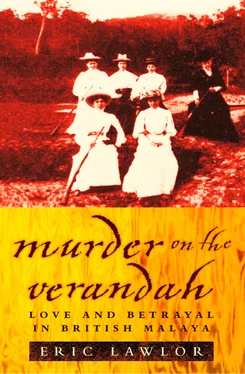It did not change. Writing as late as 1932, George Bilainkin, who edited Penang’s Straits Echo, complained that women were still being treated as if they were royals. ‘In the tropics,’ he wrote, ‘the simplest looking woman keeps every man on his mettle, for the plainest woman is a goddess.’ As Bilainkin described it, this made for extravagant behaviour. ‘Men are everywhere,’ he went on, ‘paying them idiotic compliments, running almost to greet them, jumping up as soon as they show signs of rising – spreading a smile as wide as a cat’s at a woman’s sign of willingness to dance.’
The authorities in Malaya had badly underestimated the impact of the Proudlock case. Could they have known the uproar it would cause and the divisions it would engender, it is unlikely that Ethel would ever have been tried. When the death sentence was handed down, there were complaints that the judge had been over-zealous; that he had failed to understand the intentions of those in power.
Mrs Proudlock had become a major embarrassment. Though she had her enemies, few wished to see her die on the gallows, and so it was decided to seek clemency for her. Just hours after the verdict was read, William Proudlock cabled the Secretary of State for the Colonies in London and appealed for a royal pardon in consideration of George V’s approaching coronation.
Others were busy, too. Her lawyers lodged an appeal, claiming that no motive had been established; the prosecution had unfairly painted Mrs Proudlock as a libertine; and it had not been proved that a person suffering a deep mental shock is accountable for her actions.
Also making the rounds were several petitions seeking a reprieve and addressed to the Sultan of Selangor. ‘The European petition has been signed by over 200 persons, and the Indian petition by about 500,’ the Mail reported. ‘A petition is also being prepared for signatures among the leading members of the Chinese community.’
A cablegram was dispatched to Her Majesty the Queen in Buckingham Palace. ‘We undersigned European women in Kuala Lumpur’, it read, ‘implore pardon at this coronation time for Ethel Proudlock, aged 23, wife and mother, sentenced to death for shooting.’ The cost of the cablegram, the Mail reported with some pride, ‘was almost $150’.
In Great Shelford, Cambridgeshire, Will Proudlock’s seventy-two-year-old father weighed in as well, writing to the Foreign Office to seek the help of Sir Edward Grey. In a letter dated 16 June, this former millwright told Grey that he had once worked on his estate and appealed to him to save ‘my poor daughter-in-law from the horrible fate awaiting her’. In poor health now – his sight was failing – Proudlock referred to Steward’s death as ‘this crushing calamity which has come upon me in my old age’. Ethel had not murdered anyone, he said; all she had done was defend herself ‘from being outraged by a brute’. Proudlock told Grey that he had once been a coal miner and had ‘started work in the pit as trap-door keeper at the age of eight years’. The letter ended: ‘I am, Sir, in dire distress, yours obediently, William Proudlock.’
On 26 June, the younger Proudlock received a reply from the Colonial Office informing him that if he sought leniency for his wife, he had best appeal to the Sultan of Selangor: ‘I am directed to inform you that… the exercise of the prerogative of mercy is a matter for the discretion of the local government with which His Majesty the King does not desire to interfere.’
Newspapers in England, making much of what they saw as constitutional anomalies, claimed to be shocked that an ‘Oriental potentate’ would have it in his power to determine Mrs Proudlock’s fate. But since even Lord Northcliffe must have known that this, like all the sultan’s other powers, was circumscribed, the ‘shock’ was largely bogus. Besides, this ‘potentate’ had a good heart. Richard Winstedt, who wrote the first Malay–English dictionary, described him as ‘a mild gentleman of refined manners and instincts’ whose hobbies ‘were religion, cookery and wood-carving’. (According to Winstedt, who was recovering from malaria when Steward died, the nurses looking after him in a Malayan hospital had no sympathy for Ethel. She had disgraced her sex, they said, and, in their estimation, hanging was too good for her. That changed, though, when the verdict was handed down. Then they went around the wards pleading with their patients to press to have her pardoned.)
Also on 26 June, the sultan responded to the petition signed by the European ladies: ‘In reference to your petition praying for a free pardon for Mrs. Proudlock now under sentence of death, I am directed to inform you that an appeal has been entered against the verdict and that the consideration of your petition will be deferred until the result of the appeal is declared or the appeal is abandoned.’
To the shock and dismay of her supporters, her legal advisers among them, Mrs Proudlock now withdrew her appeal and announced that she was placing herself entirely at the sultan’s mercy. In a letter sent to Wagner but clearly intended for public consumption, she said it would be at least a month before the court of appeal took up her case, and she feared that the wait would prove too much for her.
‘The suspense is simply awful,’ she wrote. ‘I am, as you are probably aware, in a condemned cell. Each day and night the only time I am not locked up behind iron bars is when the jailer takes me out for exercise. The continual supervision has got on my nerves to the extent that I feel that another month of it would deprive me of my reason.
‘I have a horror of appearing in court again. My recollections of it are so terrible that I cannot bear the idea of having to go through it all over again. I do not feel that any punishment could cause me more pain and suffering than I have already endured. Conscious of my own innocence of the terrible charge against me, I shrink from being stared at and pointed out as a condemned criminal.
‘I am told that various petitions have been sent to His Highness the Sultan asking that I may be pardoned. I hope that he may be made to take pity on my sufferings.’
Conscious that her decision would disappoint her supporters, she extended her apologies: ‘I hope they will understand. Perhaps if they saw my cell they would say so. I am unfeignedly grateful to them all, and I will ask my husband to convey to the ladies of Penang and other parts my sincerest thanks for their sympathy to one in such terrible trouble as myself.’
Not everyone was mollified. ‘No one could have read the pathetic letter which Mrs. Proudlock addressed to her counsel unmoved,’ the Mail said on 1 July. ‘On the whole, however, we cannot help thinking that it would have been better had the appeal been allowed to proceed.’
The ambivalence was understandable. While her supporters did not wish to see her suffer, an appeal might have resulted in an absolute acquittal. That would now not happen. Even if, as seemed more and more likely, the sultan did grant her a pardon, the verdict of murder would stand, and Ethel would remain a convicted killer. Some saw this as less than satisfactory. They wanted all taint of guilt removed because only when she was exonerated would they be exonerated. As things stood now, there would always be a doubt. Had this woman – to all appearances chaste and modest – killed her lover in a fit of jealous rage? And if she had, what did it say about other apparently modest women?
Events now began to move swiftly. On 1 July, the Mail expressed its pleasure that ‘intimation that the sentence will be commuted’ had been relayed to Mrs Proudlock and that the good lady had been moved from Death Row and was again in ‘one of the ordinary cells of the jail … She will know the extent to which the sentence has been commuted in a couple of days – on Monday, we believe, when the Sultan of Selangor is to sit in council to deal with the matter.’
Читать дальше












